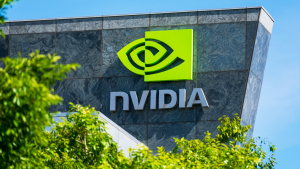
There’s been plenty of talk about a recession that hasn’t arrived. Although the recession talks have been around for a few years, you can only kick that can down the road so far before it comes full circle. The macroeconomic atmosphere is, to put it bluntly, horrible. Student loan payments will resume in September during a time when consumers hit a record-breaking $1 trillion in credit card debt. 30-year mortgage rates are approaching 8% while inflation is rising again. In this kind of environment investors tend to begin looking at which growth stocks to sell from their portfolios.
When the music stops, growth stocks tend to get hit the hardest. Investors look more carefully at valuations and financials to gauge if a company is worth its current price. These three growth stocks to sell look concerning with their current valuations and financials.
Nvidia (NVDA)

Nvidia (NASDAQ:NVDA) sparked a rally after reporting its Q1 2024 earnings. Investors got excited about how artificial intelligence could lead to higher demand and better earnings. However, there’s one problem with demand. People need enough money to buy goods and services outside of necessities to help companies generate strong revenue and earnings growth.
Nvidia shares have increased by more than 200% year-to-date and have an excessive 227 P/E ratio. That didn’t stop a Morgan Stanley (NYSE:MS) analyst from calling the stock a “Top Pick,” a move that resulted in the stock gaining 7% in one trading day. A single analyst’s opinion shouldn’t drive a stock up by 7%. Strong earnings or a company announcement should be the key factors that generate that type of movement.
Artificial intelligence is a revolutionary technology with many possibilities. It is here to stay, and many companies are investing in it. Nvidia is a top player in this industry, but it doesn’t mean Nvidia deserves a valuation this high.
Good companies become growth stocks to sell if they get too expensive. Nvidia fits this category, especially as dark macroeconomic clouds loom large.
Meta Platforms (META)

Meta Platforms (NASDAQ:META) has shocked many investors with a 141% gain year-to-date. To the company’s credit, the recent earnings report was better than expected. Meta Platforms grew its revenue by 11% year-over-year and saw its net income go up by 16% year-over-year.
The earnings report does not justify the type of movement Meta Platforms has had this year, almost fully recovering and getting close to its all-time high. Meta Platforms stock has moved as if the entire ad market has recovered and consumer spending will remain unscathed from the challenges discussed earlier.
The company currently has a 37 P/E ratio which gives the company very little margin for error. Meta Platforms’ valuation also makes it vulnerable when the ad market slows down due to weakening consumer spending.
Tesla (TSLA)

The focus of this article has been growth stocks that have rallied too much and now have excessive valuations. Tesla (NASDAQ:TSLA) is no exception to this rule, and shares have soared 115% year-to-date. This same company saw its shares crash by over 70% from the 2021 peak to the 2023 trough.
Tesla has seen its profit margin narrow from 15% to 10%. That profit margin is still higher than most automobile companies but the high valuation creates little room for error. In a concerning move for the stock, Tesla decided to cut the price of its Model Y long range SUV and performance vehicles by almost $2,000. The price drops represent 4.5% and 3.8% decreases, respectively.
Corporations don’t lower their prices to serve customers. They only lower prices when demand is weakening. China is Tesla’s second-largest market, and declining demand can put pressure on the company’s financials and valuation.
On the date of publication, Marc Guberti did not have (either directly or indirectly) any positions in the securities mentioned in this article. The opinions expressed in this article are those of the writer, subject to the InvestorPlace.com Publishing Guidelines.





